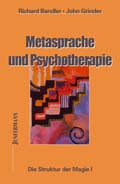Topic Overview
» Quote
» Meta-Model Part (1)
» Exercise for this week
» Supplementary Links
» Metaphor of the Week
» Book Recommendation
» General Information
Resources
Valuable resources are available for you – including NLP Practice Groups, NLP Library and NLP Online Community
Archive
Lessons
» Eye Patterns (11)
» Anchoring I (12)
» Anchoring II (13)
» Reframing I (14)
» Reframing II (15)
» Identity (16)
» Transform. Vocabulary (17)
» Questioning Techniques (18)
» Meta-Model I (19)
Audio/Video Contributions
» Eye Access Cues
» What is an Anchor?
» Anchoring Self-Confidence
» Set Anchor
» Reframing Examples
» The farmer and the horse
» Identity - Who are we?
» Meta-Model of Language
Text Articles
» Eye Access Cues
» Anchors in Everyday Life
» Smell Anchor
» reframing
» Types of Reframing
» Development of Identity
Success Checks
» Testing 01
» Testing 02
» Testing 03
NLP Email Training 19
Quote
“From the meeting of preparation and opportunity arises what we call happiness.”
Anthony Robbins
Meta-Model Part (1)
In the last lesson, we dealt with well-known questioning techniques. In this lesson, we will also focus on questions. Our topic this time is some Meta-Model patterns. The Meta-Model of language provides us with many very good questions to recognize and question distortions in the language and the maps of other people. It helps us gather information, provide others with more clarity about themselves, and often serves as a small intervention when it comes to dissolving beliefs and limiting assumptions. Formulate your own question for the following patterns and think of three more examples for each type.
a) Question generalizations such as “never, always, no one, everyone, all.”
Example sentence: “Everything always goes wrong for me?”
Question: “Does everything really go wrong for you? Is there nothing that hasn’t gone wrong for you? Was there no situation where you did something right?”
Training sentences: “No one loves me. Everyone is against me. I always block myself.”
b) Question words like “must,” “should,” and “may.”
Example sentence: “I must not show weakness?”
Question: “What would happen if you did show weakness once?”
Training sentences: “I must finally grow up.” “We must not give in now.” “You should not praise the day before the evening.”
c) Comparisons where it is not stated what the comparison refers to.
Example sentence: “He is better.”
Question: “In what way is he better?”
Training sentences: “The other team is simply faster.” “He simply has more.” “This task is easier.”
Exercise for this week
It's best to do this exercise with a partner. Imagine you are a salesperson in a bicycle shop and they are the customer. The customer wants to buy a bicycle from you. Try to find out, based on the presented questioning techniques (or those you know), which bicycle the customer, i.e., your partner, desires. It’s best to take a piece of paper. Try to get by with few questions!
If you have a sales, consulting, or employee conversation coming up, you can of course try it out directly there!
Supplementary Links
Audio:
Meta-Model »»»
Here you will find a short audio introduction to the Meta-Model of language.
Metaphor of the Week
The Glass Sarcophagus
An oriental king had a magical wife whom he loved above all.
Whenever he had time, he sought her company.
One day the woman died, leaving the king in great sorrow.
“Never,” he exclaimed, “will I part from my beloved young wife.”
In a glass sarcophagus, he laid his wife in the largest hall of the palace and placed his bed next to hers, so as not to be separated from her for a minute. However, it was a hot summer, and despite the coolness of the palace, the corpse of the woman slowly began to decay. Her lovely face began to discolor and became more and more bloated day by day. The king, in his love, did not see this. Soon the sweetish smell of decay filled the entire room, and none of the servants dared to even stick their nose in.
The king himself, with a heavy heart, took his bed and carried it into the next room. Although all the windows were wide open, the smell of decay followed him. All servants and friends fled. Then the king lost consciousness. The Hakim, the doctor, had him taken to the great garden of the palace. When the king awoke, a fresh breeze swept over him. The scent of roses caressed his senses. It seemed to him as if his great love were still alive. After a few days, life returned to the king. Reflecting, he looked into the blossom cup of a rose, and suddenly he remembered how beautiful his wife had been in life. He picked the rose, placed it on the sarcophagus, and ordered his servants to hand over the corpse to the earth.
Notes:
If we cling to the beloved, it makes us sick – we poison ourselves.
If we carry the beautiful, the valuable, the good memories within us like a rose,
deep in our hearts, as a gift, then we are rich and can grow.
Book Recommendation

Meta-Language and Psychotherapy. The Structure of Magic
Authors: Richard Bandler & John Grinder
Short Description:
This book is really not easy to read. The language is often peppered with technical terms
and one needs a bit of patience to truly be fascinated by the work.
However, it is a historically significant book – the first book by Bandler and Grinder
and thus the first NLP book ever.
The focus of the book is the Meta-Model of language. This is developed and many examples
are discussed regarding questioning possibilities. The authors do not want to develop a new therapeutic direction with this volume
(later it did become one), but rather to make the linguistic skills of some well-known therapists
understandable and learnable.
Here the book can be ordered: Now on Amazon
General Information
NLP Practice Groups
If you are still looking for someone for an NLP practice group near you, then take a look here: www.nlp-peergruppen.de
Archive
We have created a Archive with the past lessons and links created. There you will also find this lesson again as a webpage in HTML. There are always some email programs that display strange characters and do not receive clean emails in either our text or HTML format. In this case, use the online archive to read the lessons. Also use the archive if you quickly need a link, have lost one of the previous lessons, or have not received a lesson.
Advanced NLP Seminars
Of course, we also offer real seminars with personal encounters. This starts with our free NLP Evening Seminars in various cities in Germany and goes up to complete, twenty-day trainings: Practitioner, Master, Trainer and Coach.
Unsubscribe
You are receiving this email because you or a friend of yours ordered it directly from me. If you no longer wish to receive the email training, please use the link provided at the very top above the logo to unsubscribe. There you can also change your email address.
Live your dream!
Stephan Landsiedel







